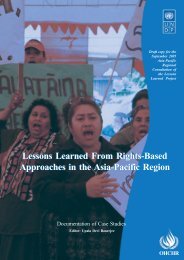View / Download - HRBA Portal
View / Download - HRBA Portal
View / Download - HRBA Portal
Create successful ePaper yourself
Turn your PDF publications into a flip-book with our unique Google optimized e-Paper software.
Exclusion in law-making processesSeveral case studies, including in Fiji and the Philippines, addressed historic exclusion and discriminationthrough the enactment of specific laws (the Family Act in Fiji 9 and Indigenous Peoples’ Rights Act [IPRA] 10in the Philippines).The Fiji case study, based on experience after enactment of the national Family Law, provides a stepby-step“manual” for campaign for law reform to secure inclusive governance, enhancing participation ofdisadvantaged groups and identifying strategic entry points of influence.The Philippine case study, meanwhile, provides an engrossing account of how different groups, suffering fromdiscrimination and exclusion under the Marcos dictatorship, tried to use participation in subsequentlegislative processes to gain inclusion. In these efforts, crucial avenues of access included electoral processes,influencing the setting of the public agenda, and access to the legislature.These were buttressed by strategicthinking and action; confrontation, negotiation and compromise; and parallel informal interventions. Suchfindings have general salience for successful legislative policy and advocacy interventions.RecommendationsThe Philippines case study offers several pragmatic recommendations for those seeking inclusion inlaw-making processes aimed at disadvantaged groups, civil society support groups, the State, multilateralorganizations such as UNDP, and research institutions that can play a positive role through policy supportand advocacy.Exclusion in judicial and dispute resolution processesFrom different perspectives, several of the case studies focus on access to justice for groups excluded ordiscriminated against, notably women (Bangladesh, Fiji, India, Iran) and indigenous peoples (Bangladesh,India).These studies identify obstacles to access to justice for such groups and ways of overcoming them.Obstacles may be internal to the group, such as limited legal or activism knowledge, as well as languagebarriers. Others relate to economic constraints, leadership gaps, remoteness of communities, inter-ethniccompetition, lack of media attention, and political instability.Some of the case studies (Cambodia, Philippines) also explore the interface between the formal legalsystem and the customary or indigenous law system, examining both complementarity and prejudice.However, such interface may be minimal, as the Cambodia case study of traditional conflict managementfor indigenous peoples found.9Family Law Act (2003).10 Republic Act No. 8371 (1997).6



